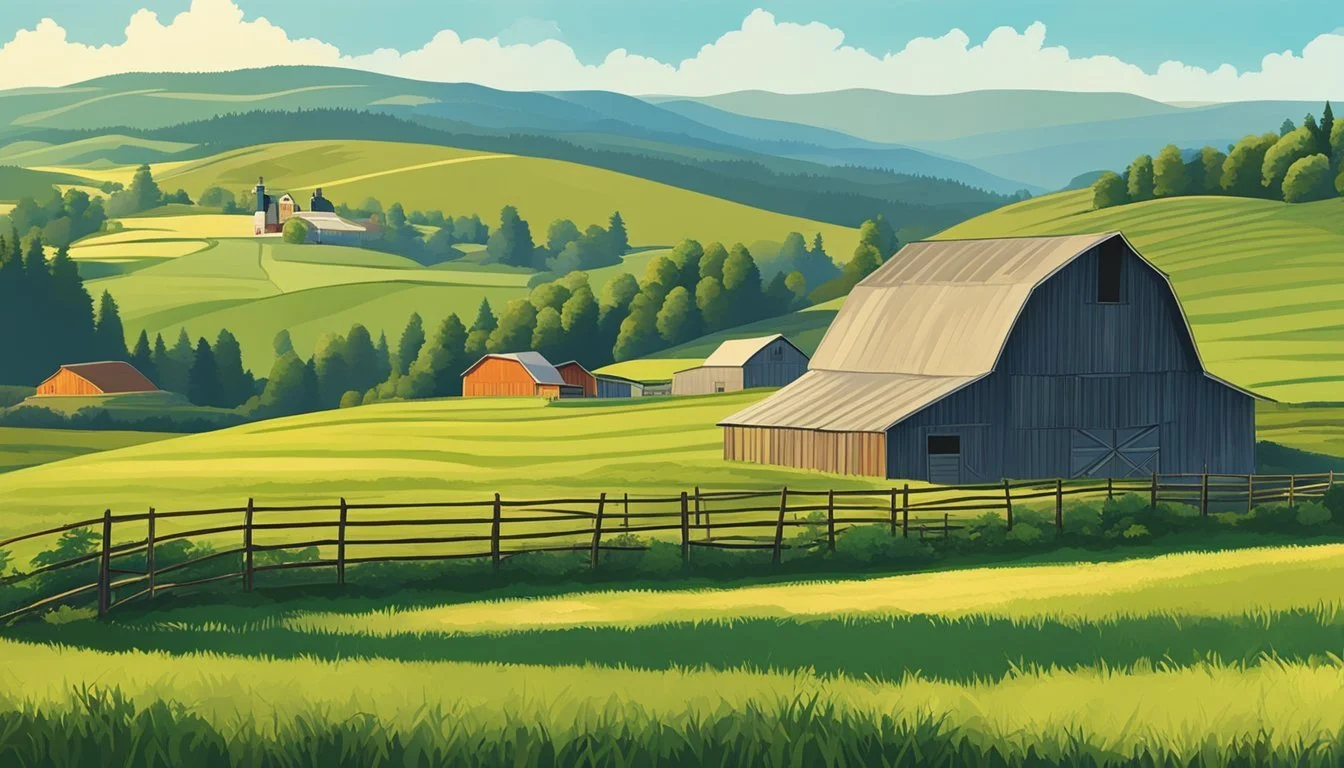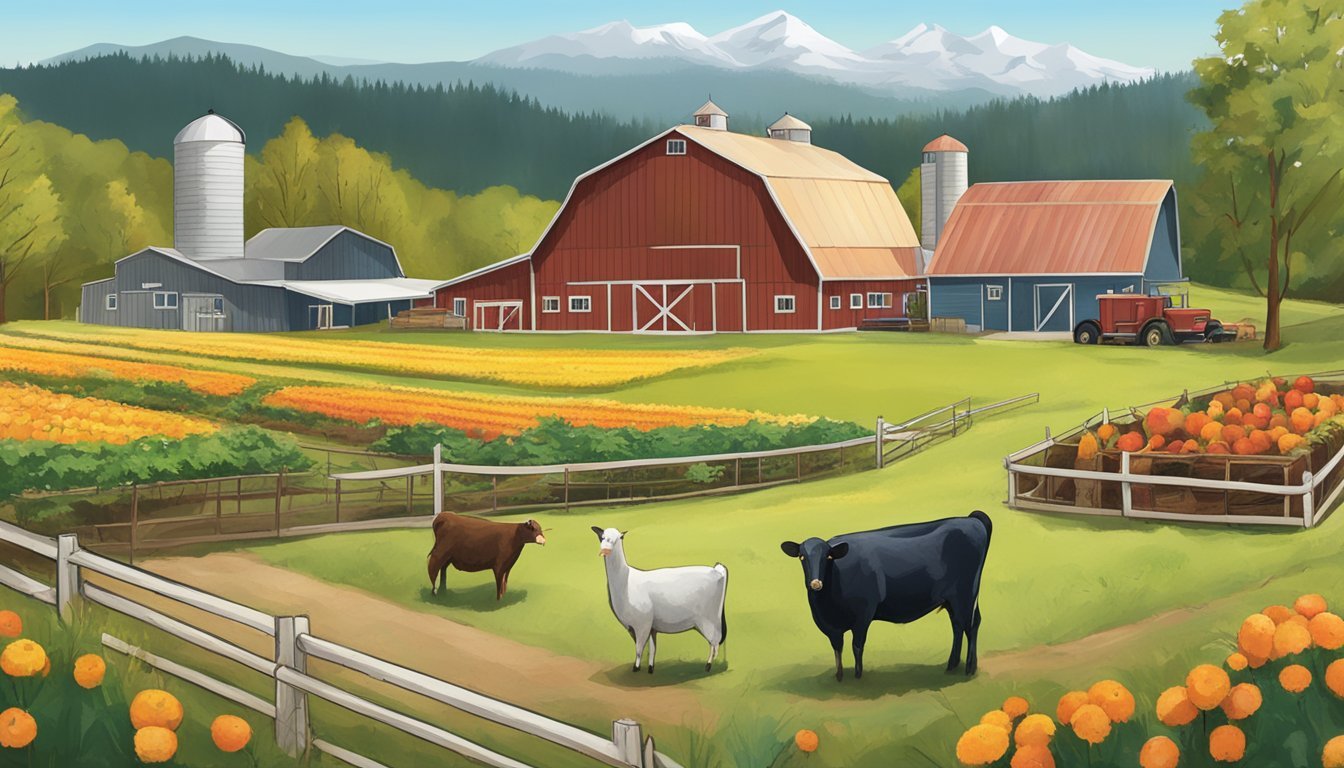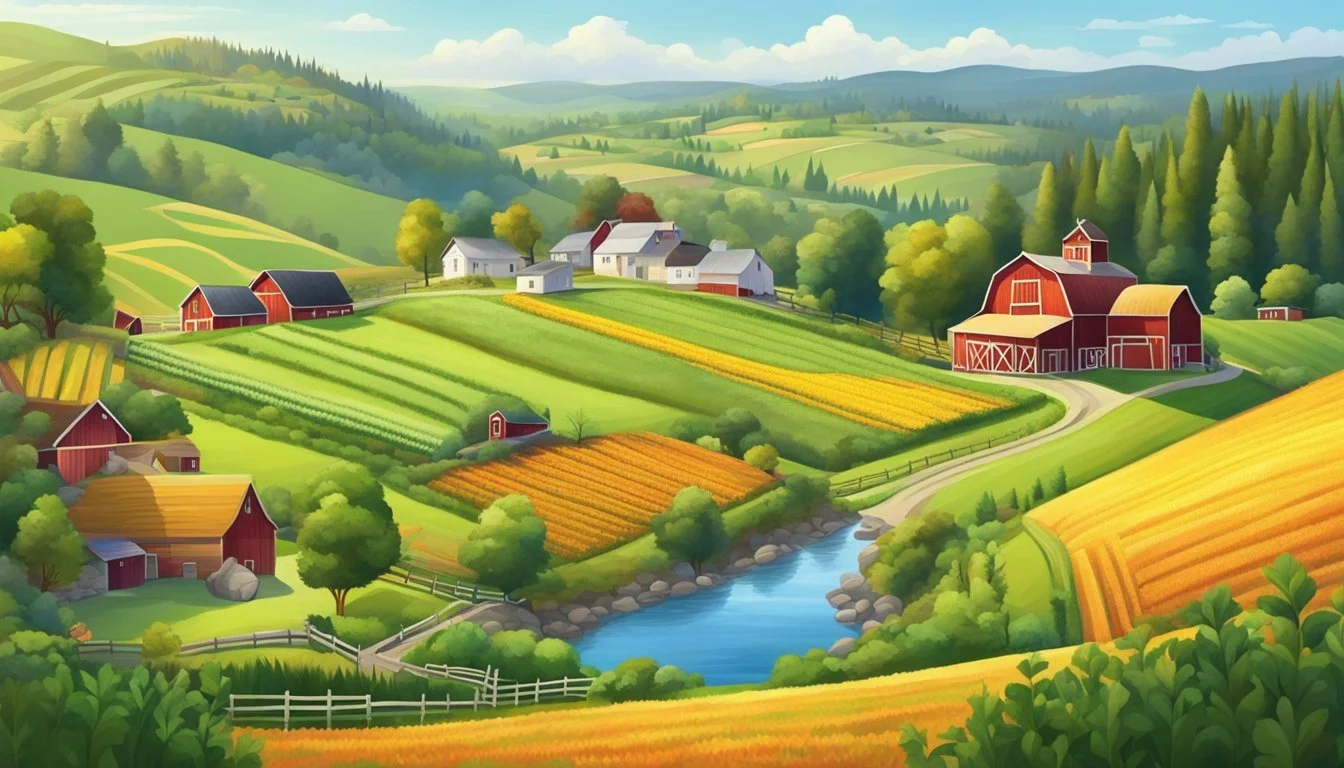Agritourism in Washington
Exploring Sustainable Farms and Local Food Experiences
Agritourism in Washington State is a growing industry that offers visitors an engaging way to experience the region’s rich agricultural heritage. This form of tourism combines agricultural activities with hospitality, inviting tourists to partake in a variety of experiences such as fruit picking, wine tasting, and educational farm tours. Through these interactive opportunities, visitors not only learn about farming and food production but also contribute to the local economy.
Washington’s diverse landscape provides the perfect backdrop for a myriad of agritourism activities. With its fertile soil and favorable climate, the Evergreen State is home to herb farms, bustling farmers markets, fragrant lavender fields, and elegant wineries. These attractions allow tourists to explore the state's agricultural abundance and enjoy fresh, local produce directly from the source.
As the industry thrives, agritourism also presents challenges and opportunities. On one hand, it offers farmers additional revenue streams and the chance to diversify their business models. On the other hand, it requires balancing tourist activities with the fundamental practices of farming. Washington State University and other institutions continue to support the growth of agritourism by researching its impacts and helping farmers navigate this evolving sector.
Understanding Agritourism
Agritourism combines the essentials of agricultural production and tourism, becoming a vital aspect of Washington State’s diverse industry.
Definitions and Concepts
Agritourism involves a commercial enterprise that connects agriculture with tourism. The primary goal is to bring visitors to farms, ranches, or other agricultural operations for entertainment and education while providing a source of income for the business owners. This includes a range of activities such as winery tours, U-pick fruits, roadside stands, and agricultural festivals.
Historical Context in Washington
Washington State has incorporated agritourism into its agricultural sector, supporting small farms and rural communities. As early as 2007, there were 342 farms reporting income from agritourism, according to the Census of Agriculture. This involved an array of activities which not only promoted agriculture but also preserved Washington's agricultural heritage and culture.
Importance to Washington's Economy
Agritourism has grown to be an important component of Washington's economy. It allows for the generation of additional revenue for farmers beyond traditional farming, strengthening the economic stability of the agricultural sector. Small farmers, in particular, find agritourism crucial as it helps sustain their operations by offering services such as event hosting.visitor enjoyment.
Agritourism Destinations in Washington
Washington State's agritourism offers a wide array of experiences, from hands-on farm activities to indulging in locally-sourced wines. Visitors can explore and connect with the rural lifestyle and the state's agricultural heritage.
Popular Farms and Ranches
The Herbfarm presents a global palette through its culinary experiences, incorporating fresh, seasonal ingredients from the Pacific Northwest. Similarly, farms such as 600 Arrowsmith Rd and 123 Rayburn Rd. West host visitors with a focus on farm-to-table dining, rural hospitality, and a close-up look at farming operations.
Wineries and Hops Farms
Washington's diverse terrain and climates foster a rich wine-growing region, particularly known for its premium wines. Columbia Valley and Yakima Valley stand out as key areas where visitors can tour vineyards, taste local wines, and learn about viticulture. The state is also a major producer of hops, essential for the thriving craft beer industry, and farms here offer tours and hops-related experiences.
U-Pick and Farm Stands
U-Pick farms and farm stands across the state allow visitors to harvest their own fruits and vegetables, such as apples, berries, and pumpkins. These hands-on activities provide insight into the region's agriculture and are a family-friendly way to enjoy fresh produce directly from the source. Wenatchee, known as the "Apple Capital of the World," offers a unique U-Pick experience with its vast apple orchards.
Activities and Experiences
Agritourism in Washington offers a plethora of activities and experiences that cater to a variety of interests, from educational endeavors to leisurely recreation. Visitors can expect to engage in hands-on learning, enjoy seasonal festivities, and explore agricultural wonders across the state.
Educational Tours and Workshops
Washington State provides a host of educational tours and workshops that allow individuals to gain insight into the agricultural processes and sustainable farming practices. They can participate in guided tours of herb farms and vineyards, and attend workshops on topics such as beekeeping or organic farming methods.
Key educational experiences include:
Beekeeping demonstrations
Organic farming technique workshops
Vineyard and winemaking tours
Recreational Activities
For those seeking recreational activities, Washington's agritourism venues offer a range of outdoor pursuits. From U-pick fruit and vegetable farms to scenic trail rides on horseback, visitors have the opportunity to immerse themselves in the rural lifestyle.
Popular recreational activities involve:
U-pick berry fields
Horseback riding on trails
Fishing in farm ponds
Cultural Events and Festivals
Agritourism also celebrates Washington's rich cultural heritage through various events and festivals. These include seasonal harvest festivals, farmers markets, and wine tasting events that showcase the state's agricultural bounty and artisan products.
Festivals and events to attend:
Harvest festivals with local produce
Farmers markets featuring local artisans
Wine tasting and vineyard events
Seasonal Attractions
Seasonal attractions draw visitors with enchanting displays like pumpkin patches in the fall and vibrant flower fields in the spring. Corn mazes and holiday-themed farm tours are a delight for families and offer entertainment for all ages.
Must-visit seasonal attractions:
Pumpkin patches and hayrides in autumn
Lavender fields bloom in late spring and early summer
Winter holiday markets and farm tours
Community and Economic Impact
Agritourism contributes positively to Washington State by supporting local farmers, creating jobs, and preserving cultural heritage. This multifaceted impact fosters sustainable economic development within communities.
Support for Local Farmers
Local farmers in Washington benefit directly from agritourism activities. They provide an additional revenue stream, which alleviates some of the financial pressures from traditional farming. In 2007, the average farm income was reported at $172,917 per farm. Agritourism offers farmers an opportunity to diversify their income and reduce the risk of declining returns from conventional agriculture.
Job Creation and Income
Agritourism has been significant in job creation and generating income for local communities. By extending beyond traditional farming, it encompasses a range of activities that require additional labor and services. This expansion can lead to an array of job opportunities not only on the farms but also in the wider community, supporting the local economy.
Cultural Preservation
Farms engaging in agritourism often aim to educate the local populace about agricultural processes and heritage. This education helps maintain and foster a connection to the region's agricultural roots, ensuring that valuable traditions and practices are upheld. By highlighting Washington's diverse agricultural products, agritourism helps preserve the state's unique agricultural culture.
Starting an Agritourism Business
Entering the agritourism industry involves careful planning, effective marketing strategies, and an understanding of potential challenges. It enables farmers to expand their commercial enterprise through entrepreneurship and offers unique experiences to the public.
Business Planning and Management
In planning an agritourism business, it is crucial to identify clear objectives and outline the necessary steps to achieve them. Entrepreneurs should conduct a market analysis to understand customer demand and an Agritourism Enterprise Checklist may assist in ensuring critical aspects are considered. Financial planning, liability concerns, and developing a diverse income stream are core components business owners must address.
Income Streams: One can explore various options such as U-pick activities, farm tours, or seasonal festivals.
Liability: Business owners should be well-informed about the legal implications and ensure proper liability insurance.
Marketing and Promotion
A robust marketing plan is essential to attract visitors and ensure the success of the agritourism business. Business owners must leverage customer relations, and promote their activities effectively to capture interest.
Online Presence: Create a professional website and utilize social media platforms.
Collateral: Develop informative brochures and signage to distribute in the community.
Networking: Engage in local tourism boards and community events to foster relationships.
Challenges and Considerations
Entrepreneurs in the agritourism sector often navigate various challenges involving regulatory compliance, seasonal fluctuations, and customer service management. Awareness and preparation for these issues are key factors in sustaining the enterprise.
Regulatory Compliance: Stay informed about zoning laws and health and safety regulations.
Seasonal Revenue: Plan financials acknowledging the variable income due to seasonality.
Customer Experience: Consistently aim to meet and exceed visitor expectations through quality experiences.
Regulations and Compliance
In Washington State, agritourism operators must navigate a framework of regulations and state laws pertaining to zoning, insurance, and liability. It is imperative for businesses to ensure they are in full compliance to operate legally and protect their interests.
Zoning and Land Use
Agritourism activities often hinge on local zoning and land use regulations. Operators must verify that their land is zoned appropriately for agritourism purposes, as these regulations dictate the types of activities allowed. For example:
Commercial Enterprise: Agritourism must link agricultural production with tourism activities.
Location Restrictions: Specific areas may be designated solely for agricultural production, limiting the scope for ancillary tourism activities.
Insurance and Liability
The aspect of insurance and liability is paramount in agritourism. Washington State laws provide certain immunities to agritourism professionals but also impose duties on them to maintain visitor safety.
RCW 4.24.832 Immunity: This law grants agritourism entities immunity under specific conditions, which does not extend to willful or wanton disregard of safety.
Duty to Supervise: There is a duty for operators to reasonably supervise activities, ensuring that the experiences they offer are suitable for participants of different ages.
Operators should obtain comprehensive insurance policies that cover the unique risks associated with agritourism to protect both their business and their patrons.
Agritourism Resources and Education
Agritourism in Washington State benefits greatly from a variety of educational resources and institutional support, ensuring that farmers and visitors alike receive accurate information and experiential opportunities.
Cooperative Extension Services
Washington State University Extension provides critical support for agritourism ventures. Their services extend to offering guidance on best practices, connecting local farmers with markets, and providing educational materials that help agritourism businesses to thrive. They specifically focus on integrating agricultural production with tourism to foster both education and income for agricultural enterprises.
Key Services Offered by WSU Extension:
Guidance on agricultural practices
Marketing assistance
Agritourism development workshops
University and Research Institutions
Washington State University stands out as a pivotal institution for agritourism research and education. It offers a wealth of knowledge through various studies that inform and enhance the state's agritourism sector. Additionally, research conducted by the university informs policy development and offers insight into economic trends within agritourism.
Noteworthy Contributions by Research Institutions:
Comprehensive industry profiling
Income and expenditure trend analysis
Educational program development
Farmers and educators in Washington also benefit from resources provided by the University of Vermont, which has been known for its cooperative extension service focusing on agritourism. This service supports a network sharing knowledge on sustainable practices and business models that could be applied to Washington's unique agritourism landscape.
Case Studies and Success Stories
Agritourism in Washington State encapsulates a variety of success stories ranging from innovative farms that have transformed the agricultural landscape to comprehensive impact surveys lending insight into this burgeoning sector.
Innovative Farms in Washington
Farm Tours: Visitors looking for a hands-on agricultural experience often turn to farm tours, which have become a cornerstone of agritourism in Washington. Farms such as Chouinard's offer immersive tours that allow individuals to engage directly with farming activities and learn about sustainable agricultural practices.
Galinato and Taylor's Contribution: These key figures have significantly contributed to the development of agritourism by promoting and supporting innovative strategies for farms to diversify and increase their profitability through visitor engagement.
Impact Surveys and Reports
Wandschneider's Report: Philip R. Wandschneider of Washington State University has played a pivotal role in assessing the agritourism industry by conducting thorough studies. Reports crafted by Wandschneider provide valuable data that highlight the motivations, impacts, and challenges agritourism entrepreneurs face, offering a substantive profile of the industry within Washington State.
Future of Agritourism in Washington
The trajectory of agritourism in Washington is promising, with trends indicating increasing interest in farm experiences and direct sales. Farms are adapting to meet this demand, often by diversifying their offerings to include activities like wine tasting, educational tours, and even hosting weddings to attract visitors.
Farmers markets and local shops are instrumental in fostering direct connections between consumers and producers. They provide consumers with fresh products and a taste of the region's agricultural heritage. This symbiosis is expected to grow, reinforcing the agritourism sector.
Projections suggest that agritourism in Washington will continue to attract tourists looking for authentic experiences. Here's a glance at the expected growth areas:
Trends: An increased interest in sustainable and organic farming practices is likely to draw more visitors.
Region: The diverse climates across Washington support a variety of agritourism activities that appeal to a broad audience.
Weddings: Rural and scenic farm venues are becoming more popular for weddings, which may lead to further development of facilities on farms.
Wine Tasting: The state's robust wine industry is well-positioned to capitalize on agritourism with enhanced tasting experiences.
In summary, the combination of scenic beauty, rich agricultural heritage, and innovative farmers point to a vibrant future for Washington's agritourism industry.








